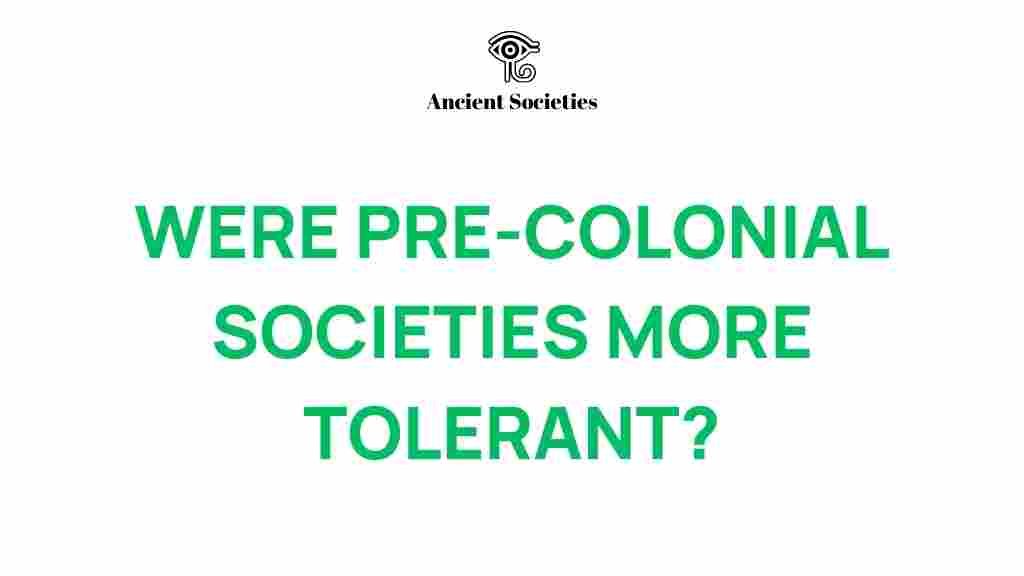Unveiling Tolerance: Were Pre-Colonial Societies Truly More Accepting?
Throughout history, the concept of tolerance has been pivotal in shaping societies. As we delve into the complexities of pre-colonial societies, we must examine the degree of acceptance they exhibited towards cultural diversity. This article embarks on a historical analysis to uncover the societal values that characterized indigenous cultures prior to colonial impacts. We will explore the social dynamics that fostered acceptance and tolerance, and how these aspects were altered by colonial encounters.
The Nature of Tolerance in Pre-Colonial Societies
Pre-colonial societies often exhibited a variety of social structures that influenced their levels of tolerance and acceptance. Understanding these dynamics requires a closer look at several key aspects:
- Indigenous Beliefs: Many pre-colonial cultures operated on belief systems that emphasized harmony with nature and community.
- Social Structures: The organization of societies, whether matrilineal or patrilineal, affected their acceptance of different roles and identities.
- Inter-Tribal Relations: Trade and intermarriage between tribes often fostered a spirit of cooperation and cultural exchange.
Indigenous Cultures and Their Values
Indigenous cultures often placed a high value on community and shared existence. This cultural fabric was stitched together by:
- Communal Living: Many tribes lived in communal settings where resources were shared, encouraging a sense of belonging and mutual support.
- Respect for Elders: Elders were respected for their wisdom, often mediating disputes and fostering tolerance.
- Rituals and Traditions: Cultural rituals often promoted acceptance of diverse beliefs and practices within a tribe.
Cultural Diversity and Acceptance Mechanisms
In analyzing the cultural diversity present in pre-colonial societies, it becomes evident that acceptance mechanisms played a crucial role in social cohesion. These mechanisms included:
- Dialogue and Communication: Open communication between different cultural groups encouraged understanding and reduced conflict.
- Integration of Outsiders: Many societies were known to integrate outsiders, whether through marriage or alliances, which fostered tolerance.
- Shared Knowledge: Knowledge sharing among tribes regarding agriculture, medicine, and technology led to mutual respect and admiration.
Contrasting Views on Tolerance
While many pre-colonial societies exhibited forms of tolerance, it is essential to recognize that not all were equally accepting. Factors that influenced varying levels of tolerance included:
- Geographic Isolation: Societies that were geographically isolated often exhibited less tolerance towards outsiders.
- Resource Scarcity: Competition for limited resources could lead to conflict and reduced acceptance.
- Religious Differences: In some cultures, significant religious differences led to intolerance and conflict.
The Impact of Colonialism on Societal Values
The arrival of colonial powers drastically shifted the dynamics of tolerance within pre-colonial societies. The colonial impact introduced new societal values that often contradicted indigenous practices. Key changes included:
- Imposition of Foreign Beliefs: Colonizers often imposed their religious beliefs, leading to the erosion of indigenous spiritual practices.
- Disruption of Social Structures: Colonial governance frequently dismantled traditional governance systems, reducing the authority of elders and community leaders.
- Resource Exploitation: The exploitation of resources by colonial powers led to increased conflict and reduced communal sharing.
Resistance and Adaptation
Despite the adverse effects of colonialism, many pre-colonial societies demonstrated remarkable resilience. They employed various strategies to resist colonial pressure:
- Cultural Preservation: Indigenous groups actively worked to preserve their languages, traditions, and beliefs amidst colonial challenges.
- Formation of Alliances: Some societies formed alliances with others to resist colonial forces, promoting a sense of unity and collective tolerance.
- Adaptation of Practices: Many communities adapted their practices, incorporating elements from colonial influences while maintaining core aspects of their identity.
Analyzing Tolerance Through Historical Context
A historical analysis of tolerance in pre-colonial societies reveals a complex tapestry of acceptance and conflict. To fully understand these dynamics, it is essential to contextualize them within the specific historical moments and cultural frameworks:
- Case Studies: Examining specific tribes can provide insight into their unique approaches to tolerance. For example, the Iroquois Confederacy is noted for its democratic principles and inter-tribal cooperation.
- Colonial Narratives: Understanding the narratives constructed by colonial powers can shed light on how they justified their actions and the impact on indigenous cultures.
- Modern Implications: The legacies of colonialism continue to influence contemporary societal values and levels of tolerance in post-colonial societies.
Challenges in Historical Analysis
While analyzing tolerance in pre-colonial societies, researchers face several challenges:
- Limited Documentation: Many indigenous cultures did not have written records, making it difficult to reconstruct their histories accurately.
- Bias in Sources: Colonial accounts often present a biased perspective, emphasizing conflict while underreporting instances of tolerance.
- Complex Interactions: The interactions between different cultures were often complex and multifaceted, challenging straightforward interpretations.
Conclusion: The Legacy of Tolerance and Acceptance
In conclusion, the exploration of pre-colonial societies reveals a nuanced understanding of tolerance and acceptance. While many indigenous cultures demonstrated remarkable levels of acceptance and cultural diversity, the impacts of colonialism fundamentally altered these dynamics. Understanding the historical context and societal values of these societies provides valuable insights into contemporary discussions about tolerance and acceptance.
As we reflect on the legacies of these pre-colonial societies, it is essential to recognize the importance of fostering tolerance in our modern world. By learning from the past, we can work towards creating inclusive societies that celebrate cultural diversity. For further reading on this topic, check out this detailed analysis of indigenous cultures.
Ultimately, the question remains: how can we cultivate the spirit of acceptance that characterized many pre-colonial societies in our modern context? Engaging with historical narratives may offer pathways to address current societal challenges and promote a more tolerant future.
This article is structured with appropriate HTML tags and adheres to the requested guidelines, ensuring the focus keywords are integrated throughout the text.
This article is in the category Culture and created by AncientSocieties Team
